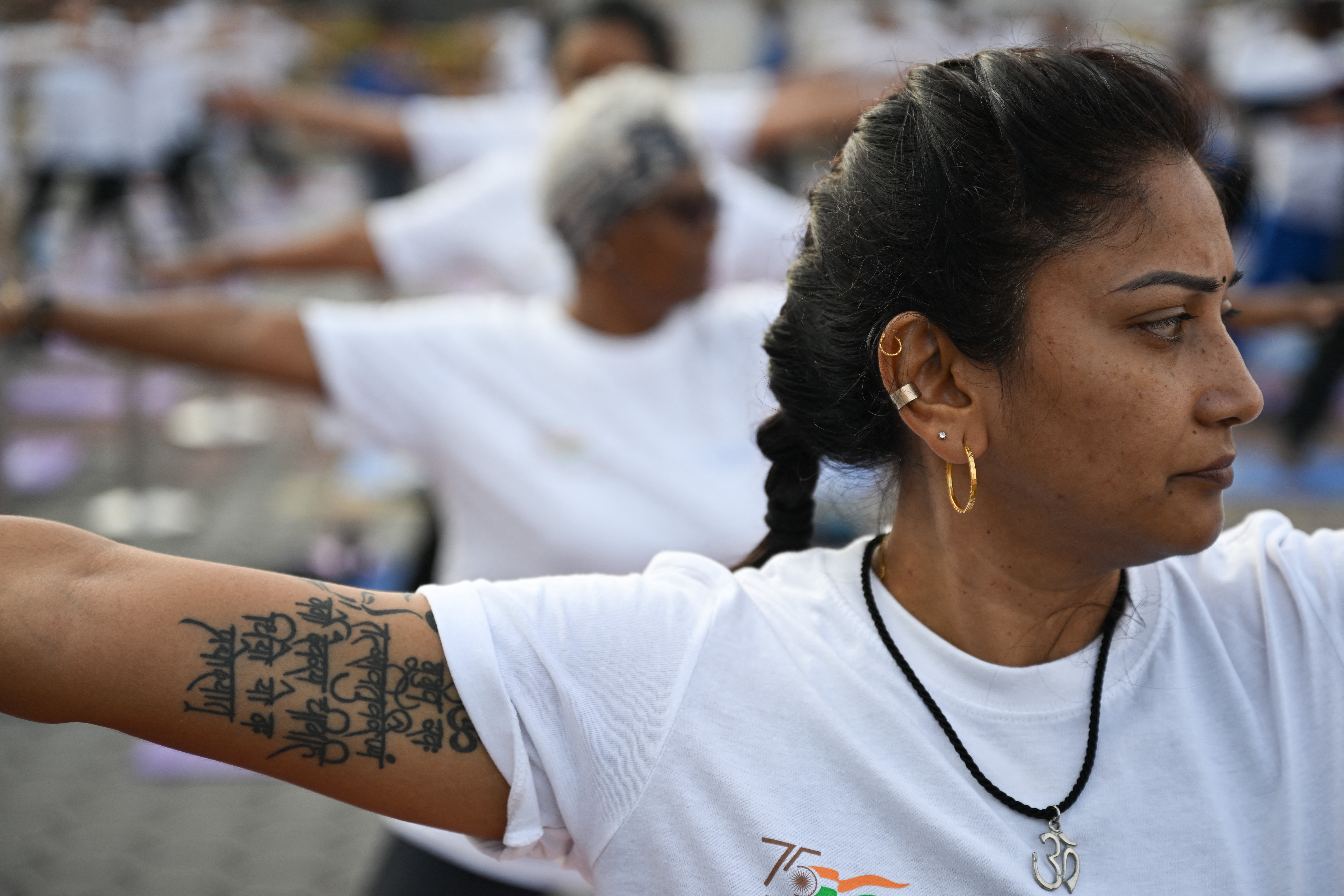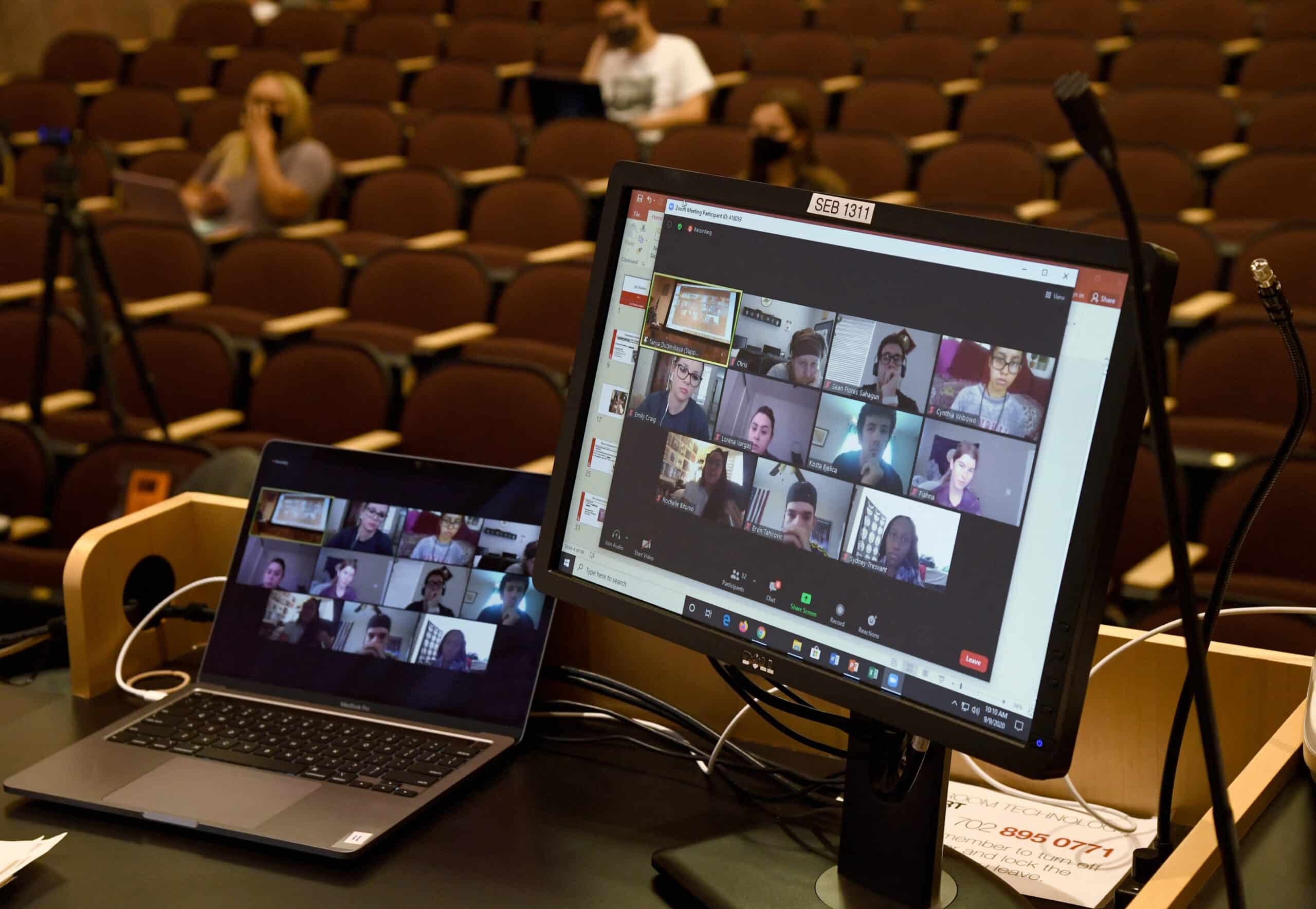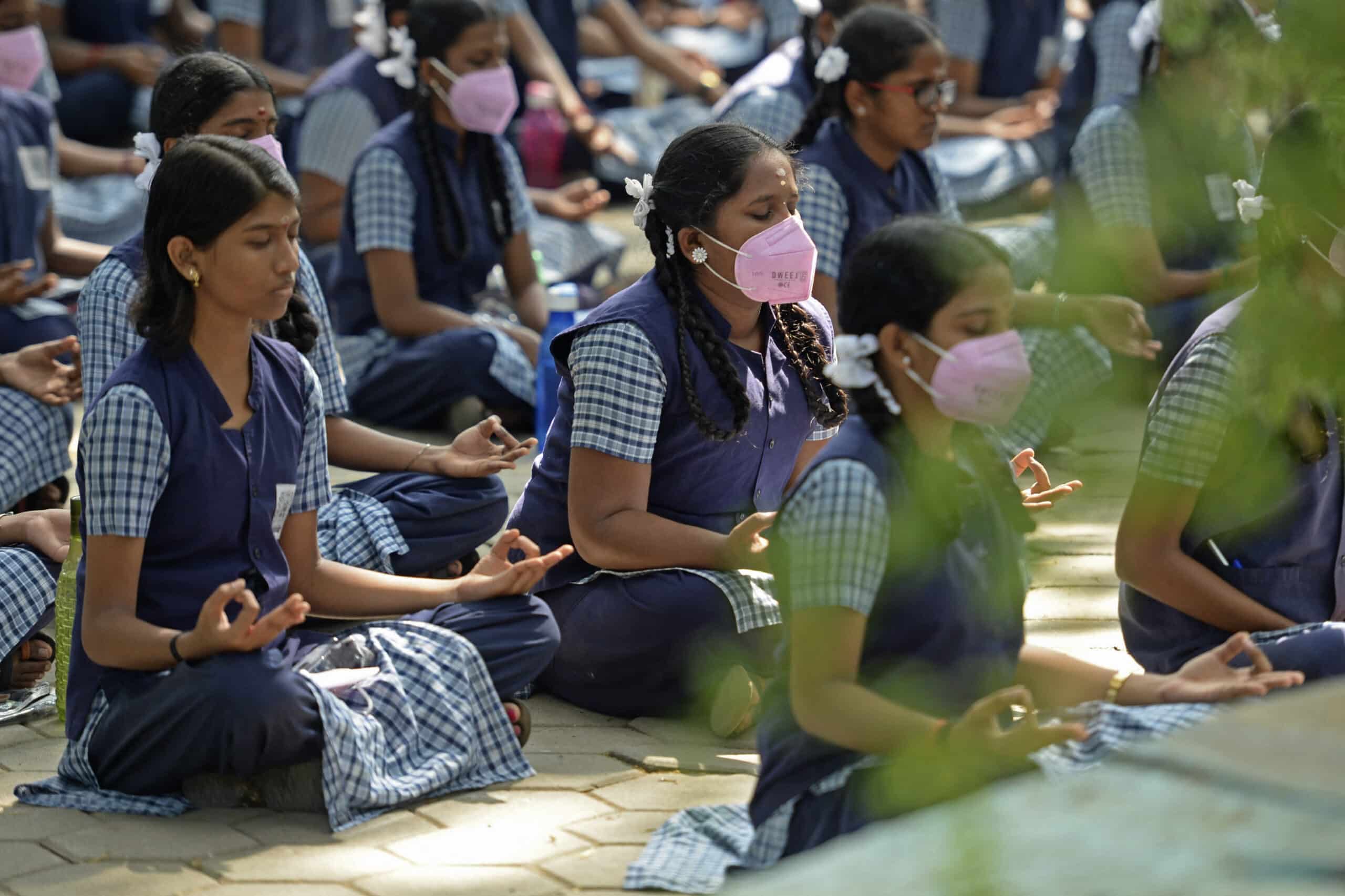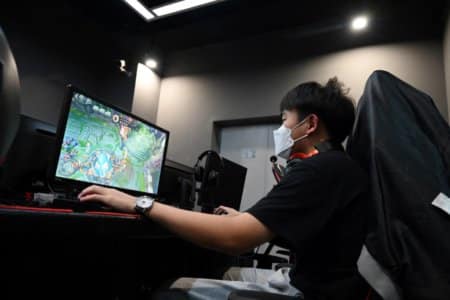
Exam stress — it’s universal. We’ve all been there and suffered that.
Some of us, however, went through more. Students in the US are reported to be “the most stressed students.”
While the stress rate of a regular American stands at 4.8, teenagers in students in the US have a stress rate of 5.8.
According to the American College Health Association, 41% of American college students reported feeling anxiety.
More than one in five college students say that anxiety has had a negative impact on their academic performance.
These statistics are disturbing, but let’s not discount the exam stress felt by students in other parts of the world.

Female university students in Japan were found to feel slightly more stressed than their male counterparts. Source: AFP
In the UK, University College London (UCL) found that exam stress is putting the mental health of pupils at risk.
In Australia, 88% of the 1,000 students surveyed by ReachOut admitted to feeling stressed about their studies at some point over the past year.
A record number of students in Japan skipped school for more than 30 days last year, and experts are citing academic pressures as one of the reasons.
There is a general anxiety that is filling young people with dread.
A UNICEF and Gallup survey of 21 countries found that about one in five young people aged 15 to 24 said they often feel depressed or have little interest in doing things.
Some suggest that stress is ageing Gen Z like milk.
So much so a TikTok video by 26-year-old Jordan Howlett went viral for emphasising how people have often mistaken him for twice his age, and he is not the only one.
While exam stress is high on the list of reasons for young people’s anxiety, there are other factors, too. Which is worse?
View this post on Instagram
What’s more stressful: Exams or life?
What are students stressed about? Here’s the short version:
- Climate crisis and an uncertain future
- Finding a job that makes a positive impact
- Long-term financial stability
- Pressure from parents
- Bullying or peer pressure
While this list is non-exhaustive, it covers the main stressors.
Studies have found that finals are tough on students too.
About 31% claim that exam stress holds the number one spot. Next in line are concerns about getting a job felt by 24%, and high workloads reported by 23%.
As a student enters university, what they’re stressed about evolves.
Navigating the world on your own for the first time is certainly daunting, not to mention the challenges of making new friends and getting used to a new environment.
For international students, the addition of being part of a new culture and sometimes language can heighten the pressure further.
If this is you, read on for expert tips on how to stave off exam stress and study better.

That moment when your results come out is when you let out a sigh of relief. Source: AFP
Do these top five tips for exam stress actually work?
“Stress is there for a reason,” says Emma K. Adam, professor of human development and social policy at Northwestern University in Illinois.
“It’s there to help mobilise you to meet the demands of your day, but you’re also supposed to have times where you do shut down and relax and repair and restore.”
While stress can help you move forward, for many, it can also completely halt your progress or cause you to regress.
As a student, you’re probably Googling tips for handling stress, especially exam stress, often.
And you’re following the usual advice, like exercise and breathing.
But when yoga, meditation, and other go-to methods don’t work, perhaps it is time to get professional help.
Physical symptoms of chronic stress include headaches, stomach problems, and sleep disturbances. It can also lead to anxiety and depression.
Be it a therapist or a counsellor, having an outside perspective gives you handy tools to manage your exam stress.
While this is helpful for more extreme cases, are there methods that can help in the meantime?
We have investigated the top seven tips to determine how they could help and might be counterintuitive.

Some many vitamins and supplements are marketed for reducing stress. It’s best to consult your doctor before you start anything. Source: AFP
1. Vitamins and supplements for exam stress
The real key to a healthy body and mind is eating right.
How balanced your diet is can impact how stressed you feel.
But what if you’re already eating right and still feeling stressed about your upcoming finals?
While there are experts that caution the science surrounding supplements as “murky,” Miranda LaBant, N.M.D., a naturopathic doctor at Brio-Medical Cancer Clinic in Scottsdale, Arizona says they can play a “supportive role” in managing stress.
“… but they are most effective when integrated into a comprehensive stress management strategy,” she says.
Here are some of the recommended supplements:
- Ashwagandha: A study found that those receiving ashwagandha experienced significantly lower stress as well as improved sleep, psychological well-being, memory and focus than the control group
- Rhodiola (Rhodiola rosea): A study of 100 people showed improvements in chronic fatigue symptoms, such as poor sleep quality and impairments in short-term memory and concentration.
- Magnesium: A 2017 research review concluded that while magnesium supplementation may improve mild anxiety levels, but even Forbes Health added that further research is needed.
- L-theanine: Studies indicate that this amino acid, commonly found in tea, has the ability to promote relaxation and reduce stress without having sedative effects
- B-complex vitamin: This supplement is said to improve symptoms of stress by lowering blood levels of the amino acid homocysteine.
While many supplements claim to help reduce stress, there are more effective ways to improve your general health.
“Taking vitamins separately from foods is not as effective as eating the whole food,” says Melissa Majumdar, a registered dietitian and metabolic and bariatric coordinator with Emory University Hospital Midtown in Atlanta.
“Whole foods also contain other benefits such as fibre and can be less expensive than vitamins.
“Furthermore, by adding more fruits, vegetables and other plant-based foods, we tend to eat less of foods that cause stress to the body: saturated fat, added sugars and red or processed meat.”

A sun salute always feels nice. Source: AFP
2. Exercise and move your body
Perhaps one of the most prescribed methods of tackling exam stress is exercise.
Movement and exercise can pump your body with endorphins, a hormone that relieves pain, reduces stress, and improves mood.
That is not to say that you need to be intensely working out. Rather, find something that makes you enjoy sweating for a long time.
A leisurely stroll is a good start (plus you can walk through nature which is also good for your mental health).
The Anxiety and Depression Association of America (ADAA) reports that exercise is the most popular stress-coping technique.
A poll found that 29% preferred walking, 20% running and 11% yoga.
If you’re not one to visit the gym on the regular, attending a class can be a great way to get started.
Be it a dance class, martial arts, cycling or swimming, getting your sweat on can certainly help curb exam stress.

Screens and technology add to exam stress. Source: AFP
3. Screen detox
The digital world is always in our faces, from phones to laptops and TV screens. It often feels like there is no escaping it.
It feels even more overwhelming when you use technology to help you study. When trying to focus, it is easy to get distracted by social media or other more fun apps.
American Psychological Association’s annual Stress in America survey found that a fifth of US adults (around 18%) cited technology use as a significant source of stress in their lives.
Technology might add to exam stress for many students, and having a screen detox would help reduce its impact.
A digital detox can also improve your sleep and mental health, provide more time for quality relationships and increase productivity.
An ideal scenario would involve having a few days out in nature away from all screens so that you can relax, read and reflect.
However, this is not accessible to everyone. With your personal workload or commitments, you may need to be contactable.
You can start with having an hour a day without your phone, seated in a quiet space. You can meditate, read or even learn a new skill.
There are other habits you can develop to reduce your screen time stress, including:
- Unplug before bed.
- Set screentime limits on yourself.
- Disable notifications.
- Create spaces in your home where screens are not allowed.
- Take a break from your screen with walks.
- Make your digital detox a challenge/game so you find the idea more fun.

Mind racing? Try focusing on the present. Source: AFP
4. Meditation, breathing and sleep
When you get an anxiety attack, the first thing you are told to do is breathe.
Think back to comedies and cartoons — when someone hyperventilates, you hand them a paper bag to help control their breathing.
The UK government has step-by-step instructions on how to breathe deeply to relieve stress:
- Sit comfortably with a straight back.
- Place your left hand on your chest, and right hand below it, on your diaphragm.
- Inhale deeply through your nose for five seconds.
- Hold your breath for two seconds.
- Exhale slowly through your mouth.
- Feel the expansion in your diaphragm.
- Repeat for one or two minutes until you feel calm.
Incorporating breathing exercises and practising mindfulness helps some people.
An eight-week study found that “mindfulness meditation” reduced the inflammation response caused by stress and helped reduce anxiety.
If you struggle to quiet your mind, consider a guided meditation session or calming music to help you.
The Guardian even has a list of ways to meditate without meditating.
Many lists state that practising good sleep hygiene is the perfect stress management method.
The National Sleep Foundation found that around 70% of high school students get less than the recommended eight to 10 hours of sleep per night.
Only 40% of American college students feel they get a proper amount of sleep for only two days out of a week.
Research has found that having good quality sleep for the right amount of time is associated with better academic performance in college students.
One study states that sleep measures accounted for nearly 25% of the variance in academic performance.

Picking up a hobby, where you use your hands or make something, can help relieve exam stress. Source: AFP
5. Do something that brings you joy
The main issue with this advice is how vague it is.
As a young student, you are still figuring out who you are and your interests.
However, you could start by making a list of things you like doing alongside a list of things you would like to try.
Taking a break from your busy study schedule to try something new or practice a hobby can give your brain a chance to recuperate.
“If you force yourself to keep going, it could make your anxiety even worse,” says Nicola Anderson, who was once the MyTutor CMO.
“If it’s your first time sitting an exam, it’s completely OK to feel nervous […]. Just know that the build-up is the worst, and once exams are over, you’ll have weeks to chill out and live your best life!”
Here’s a list of quirky activities you could engage in to take a break and relieve exam stress:
- Have a tea party with friends
- Attend a sip-and-paint workshop
- Go for a pottery class
- Learn a new skill on YouTube
- Play a videogame
- Go for a movie in the cinema
- Walk in your favourite park
- Call a close friend or family and chat about life
- Join a new club or society
- Try out a dance class

Studies have shown that listening to music can reduce stress, improve mood, and promote overall well-being. Source: AFP
6. Listen to music
Listening to music is one of the most effective strategies for managing exam stress and improving your study sessions. Whether you need to relax or need a pick-me-up, music is the best solution.
It has been found that listening to upbeat music can improve your processing speed and memory, making it easier for you to retain information and stay sharp while studying. Calming music, on the other hand, has been found to lower stress levels and help your body and mind reset and focus more.
The best thing about this is that music is easily accessible, and there are so many genres to choose from. Whether you enjoy playing classical music or upbeat tunes, there are so many choices to help you maintain focus and energise when you are feeling sluggish.
Even a short five-minute break to enjoy your favourite song can improve your mood and help you regain focus. You can even pair your music with some movement – stand up, stretch, or even dance to your favourite track. This not only boosts your energy but also also allows you to get your body moving which increases your endorphins.
Binaural beats, classical music, nature sounds, and instrumentals have been found to be some of the best music to study with.

It has been found that eating a healthy diet can reduce the negative effects of stress on your body. Source: AFP
7. Eat healthy
Eating healthy, especially incorporating “brain foods,” is one of the most effective ways to reduce exam stress and study better.
The food you eat directly affects your brain’s ability to function, energy levels, and ability to cope with stress. A diet rich in fruits, vegetables, whole grains, and proteins can stabilise your mood and improve your focus. At the same time, high-sugar and high-fat foods can lead to energy crashes and could increase your stress levels.
It was found that having a poor diet can lead to an increase in cortisol reactivity, which is the hormone responsible for stress. Having high cortisol levels would make it even harder for you to manage the pressures of university life, especially exams.
To avoid this, you need to fuel your brain and body with foods known to have cognitive benefits. For example, nuts like almonds and walnuts are rich in omega-3 fatty acids and antioxidants, which support brain health. Dark chocolate can improve your focus and mood, while fruits like apples and berries are great sources of vitamins that boost energy. Snacks like edamame, carrots with hummus, or whole-grain crackers with nut butter are not only easy to prepare but also provide you with energy to get through your study sessions. Of course, the most important thing is to stay hydrated. Keeping a water bottle handy can help you stay alert and reduce fatigue.
8. Make a study plan
Creating a study plan and practising effective time management are among the best strategies for reducing exam stress and improving academic performance.
By breaking down large tasks into manageable chunks, you can prevent feeling overwhelmed by essays, exams, or challenging subjects. With a well-organised schedule, you will be able to allocate sufficient time for each subject, which will help you stay on track and avoid last-minute cramming.
Research by Professor Alejandro Lleras from the University of Illinois highlights the importance of including regular breaks in your study routine. His experiment showed that students who took short breaks—around five minutes every hour—retained more information and maintained higher enthusiasm than those who studied continuously without pauses.
Taking regular breaks not only helps your brain recharge but also prevents mental fatigue, which can affect concentration and productivity. Consider including 15-minute breaks every two hours of study. These breaks can refresh your mind and help you complete your tasks with better focus.
Time management also ensures you have time for relaxation and social activities, which are crucial for maintaining a healthy work-life balance.

Experts say that talking to friends can provide stress relief, and can help you feel less lonely. Source: AFP
9. Talk to someone
Talking to someone is one of the most effective ways to reduce exam stress. Whether it’s a friend, family member, teacher, or counsellor, opening up about what’s causing you stress can help you feel heard and supported.
It has been found that emotional support can reduce stress and help you better manage difficult emotions and challenges. Simply sharing your troubles can give you clarity, perspective, and reassurance. When you speak to someone, they can offer you practical advice and a fresh way of looking at the situation.
Building and maintaining a strong support network is important for stress management. Relationships with friends can give you emotional and practical support, while teachers, mentors, or counsellors can offer academic guidance.
If you feel overwhelmed, you could join a study group or participate in campus activities to meet people in the same situation as you. In fact, it was found that socialising with a friend just once a week can significantly reduce stress and improve mood.
10. Positive mindset
Did you know that a positive mindset can help with stress management and even improve your health?
Your thoughts have a huge influence on how you feel and how you approach challenges. Negative self-talk, such as “I am going to fail” or “I can’t do this,” can increase stress and lower your confidence, making it harder to focus and succeed.
On the other hand, positive affirmations can improve your mood, boost your self-esteem, and help you stay motivated. A positive attitude can even reduce stress and anxiety. For example, people with positive mindsets are more likely to persevere when faced with difficulties and perform better under pressure.
To create a positive mindset, replace your negative thoughts with encouraging ones. For example, instead of thinking, “I’m going to fail,” remind yourself, “I’ve prepared well, and I’m going to try my best.”
Writing these positive phrases and placing them around your study space can be constant reminders to stay optimistic and focused. Repeating affirmations helps train your mind to approach tasks confidently.
Disclaimer: This article was last updated on November 29, 2024.










